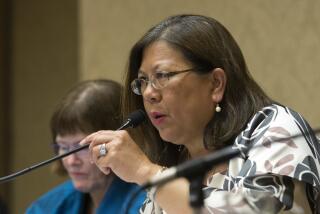How did accused politician Leland Yee get 300,000 votes?
SAN FRANCISCO — In this week’s largely sleepy California election, there was one startling result: more than 300,000 ballots cast for Leland Yee for secretary of state, good enough for third place, even though he dropped out after being accused of conspiracy to run guns and political corruption.
Yee’s tally, which is likely to grow as hundreds of thousands of uncounted ballots are processed, pushed him past a pair of good-government candidates also vying to be the state’s chief election officer — a bit of irony adding to a widely held notion, especially outside the state, that Californians are a bit nuts.
Yet although vexing and a cause of no small amount of ridicule, Yee’s surprising vote total can be explained by several factors beyond the supposed shallowness and stupidity of the California electorate.
Most have to do with the size and sprawl of the state and the lack of attention, by voters and the media alike, paid to so-called down-ballot offices like secretary of state.
Coincidence may have also contributed: Candidate Betty Yee was on the same ballot running for state controller, also a relatively obscure office. She received a number of endorsements, including the support of several newspapers and labor unions, and some voters may have simply confused the two.
Above all, the results speak to the ephemeral nature of news — even events that are widely covered or hugely hyped — in this age of perpetual information.
“People can’t even remember who won the Super Bowl,” said Richie Ross, who managed Leland Yee’s campaign before he dropped out of the race in March, after his indictment but too late to remove his name from the ballot. “And people are surprised that ordinary voters — not the political insiders and smarty-pants who follow this stuff — can’t remember who was indicted three months ago?”
“None of his opponents ran ads saying, ‘Don’t forget: Don’t vote for Yee,’” Ross added. “I didn’t see one newspaper story say, ‘Remember, voters, this man has withdrawn after he was indicted.’”
It takes a small fortune — literally — for a political candidate to become well known in California. There are 24 million eligible voters and 18 million registered; the latter figure is larger than the population of all but four states.
Most political contests, outside of races for governor or mayor of cities like Los Angeles, San Francisco and San Diego, receive scant attention beyond their immediate vicinity.
A meaningful advertising campaign for a little-noted position like secretary of state, political professionals say, takes a minimum of $3 million or so to run. No one had those kind of resources in Tuesday’s primary. (A candidate lacking the celebrity of a Jerry Brown or Arnold Schwarzenegger needs $25 million to $30 million, at minimum, to wage a viable race for governor.)
Without much information to go on, voters tend to rely on other cues in picking their way through down-ballot races and that, too, probably contributed to Yee’s surprising vote total.
As a Democrat, he starts with a built-in advantage in this overwhelmingly Democratic state, and his Asian surname doubtless brought him support within the large Asian American community. His ballot designation, state senator, also offered validation for some who may have thought government experience was good for secretary of state, an administrative position.
Many voters were probably aware of the corruption case — one of three involving Sacramento lawmakers suspended this session — but the details may have been hazy.
“If you walked into a bar and said, ‘By the way, three legislators got in trouble,’ people would probably remember,” said Allan Hoffenblum, a Republican strategist and publisher of the Target Book, a nonpartisan guide to California elections. “But if you asked the names of those three state senators, most people probably wouldn’t know.”
Federal prosecutors say Yee consorted with an alleged San Francisco Chinatown gangster, Raymond “Shrimp Boy” Chow, in a scheme that involved conspiracy to traffic in firearms, money laundering, murder-for-hire, drug distribution and what the law calls defrauding citizens of honest service, or political corruption. Yee is free on bail awaiting trial and could not be reached for comment.
There were two would-be reformers whom voters could have chosen over the indicted San Francisco lawmaker.
Dan Schnur, a USC political analyst and former chairman of the Fair Political Practices Commission, ran as an independent on a clean-up-Sacramento platform and finished fourth. Derek Cressman, a Democrat and former director of the good-government organization Common Cause, finished fifth.
The top two vote-getters, Democratic state Sen. Alex Padilla of Pacoima and Republican Pete Peterson, head of a public policy think tank at Pepperdine University, will face off in November.
Schnur said he was neither embarrassed nor discouraged by the outcome, seeing it not as a personal rejection but rather the nature of California politics.
“If voters had made a conscious decision to reject my message and embrace an accused felon, yes, that would have been very discouraging,” Schnur said in an interview. “But most voters were dealing with almost no information about either one of us.”
More to Read
Sign up for Essential California
The most important California stories and recommendations in your inbox every morning.
You may occasionally receive promotional content from the Los Angeles Times.











